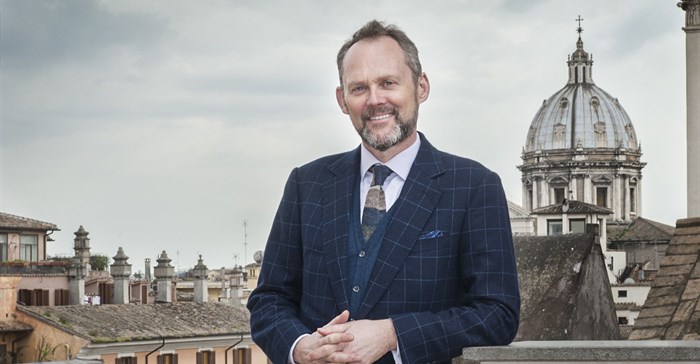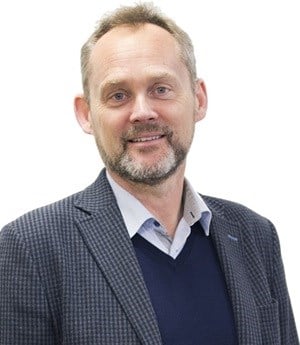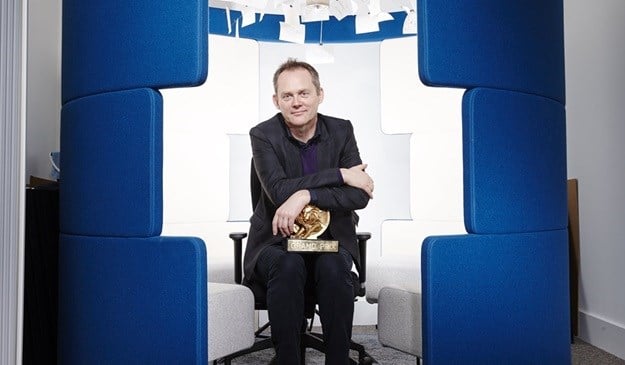#CannesLions2018: CEO Phil Thomas on the creative year ahead
 So firstly Phil, thanks for taking the time, much appreciated.
So firstly Phil, thanks for taking the time, much appreciated.
You’re very welcome.
 It’s a real honour to have you here in South Africa. Let’s start by telling our audience what your exact role is, I know it’s changed a bit in the last year.
It’s a real honour to have you here in South Africa. Let’s start by telling our audience what your exact role is, I know it’s changed a bit in the last year.
Yes, I'm still very involved in Cannes Lions but I also take responsibility for the other events that we run. We run some large fintech events, some education events, some technology events, retail events, and etcetera. But Cannes remains the biggest. OK. Our audiences obviously super interested in the media and advertising side. What would you say the current articulated purposes is, for the Cannes Lions?
OK. Our audiences obviously super interested in the media and advertising side. What would you say the current articulated purposes is, for the Cannes Lions?
Well, I think it's all about the awards. So people think of Cannes, and they often think of the event itself but really for us, the whole thing rests on the awards. So, you then have to think, ‘Well, what's the point of awards,’ and I suppose particularly in marketing advertising, there are two or three quite big reasons that people want to win awards. First is obviously just recognition. Everybody likes to be recognised, everyone likes a clap on the back, but I think in advertising and marketing, there are more important reasons.
The first is that if you are in advertising, there's very little you can do to prove that you're very good at your job.

You know, if you're a lawyer and you've won lots of cases, or if you're a banker and you've sold lots of businesses, you've got the actual proof that you're good at your job. But if you're a creative person, it’s kind of hard. It’s very subjective. So awards service that benchmark, to say ‘these people are really good at what they do’, and then the final reason I think, which we seeing more and more at Cannes is companies using awards as their measure for improving their creative output. So, they want to be more creative and the way to judge whether they're actually going forward on that journey is by winning awards.
It is a very big subject but I suppose the key changes are the relative simplicity of marketing, which was effective, “I'm a marketer what do I need? I need a creative agency who is going to come up with an idea, I need a media agency who is going buy some media for me, and I need a media owner whether is radio, newspaper, whatever, to get my message out'. So, you were the CEO for 10 years. That's quite something and I guess you know if I look at the advertising landscape over the last 10 years, it feels, arguably, to have had more shift in the last 10 years than the preceding 30, but I don't know. What did you see at the big changes from Cannes 10 years ago when you started, through to today?
So, you were the CEO for 10 years. That's quite something and I guess you know if I look at the advertising landscape over the last 10 years, it feels, arguably, to have had more shift in the last 10 years than the preceding 30, but I don't know. What did you see at the big changes from Cannes 10 years ago when you started, through to today?
Well, I think that the quote you just said is true, I actually agree with that. I think there's been more change in the last year than in the previous 10 as well, and I’d imagine the next year is going to be even faster. It’s almost incredible to look at the difference from year to year, and so trying to keep up when you're running Cannes, it's pretty difficult.
That’s it. if you compare that now to what the marketer has to think about, and the number of partners they could work with, and the data they have to work with, and the measurement that I have to understand, and the landscape and the platforms, the complexity of it is just mind-blowing and it just seems to be getting more complex all the time.
That's also behind the growth of Cannes, the number of people coming to the festival from all sorts of different industries.
 So its way harder, for the marketers involved. In the old days, you had this small tool chest, now to win you have to have this massive tool chest, and it’s just much more complicated.
So its way harder, for the marketers involved. In the old days, you had this small tool chest, now to win you have to have this massive tool chest, and it’s just much more complicated.
Yeah, I think for marketers it is becoming all but impossible for one department or one person to really cover it all. You’ve got to think about creativity, you’ve got to think about your above-the-line stuff, you’ve got to worry about transparency, digital, social, e-commerce… That's another thing, marketing now is not so much marketing as it is customer experience, so once to start talking about that, you talking about physical experience, digital experience, it’s enough to send you crazy.
Next year we’re launching three lions, which I think is interesting. There are e-commerce; experience, which is massively important, both physical and digital; and social and influencer Lions. So, you could say, ‘Right now those are the things that if a marketer hasn't got on top of those three things, then they’re not on top of their business tools, so that's an indication of the way things are going. And in order to win, you need to be current but you also need to be looking around corners and seeing what's coming. In your position, I guess you get to see what things are starting to have more impact. This is almost an impossible question to answer because I don't think Mark Zuckerberg knows exactly what Facebook is going to look like in five years, but what do you think five years look like? Does this sort of disruption continue?
And in order to win, you need to be current but you also need to be looking around corners and seeing what's coming. In your position, I guess you get to see what things are starting to have more impact. This is almost an impossible question to answer because I don't think Mark Zuckerberg knows exactly what Facebook is going to look like in five years, but what do you think five years look like? Does this sort of disruption continue?
Yeah, I think it does continue, at Cannes is we try to anticipate or ride the wave just at the right time, and you know we do that by the Lions that we introduce because it's really important that our Lions reflect the work people are doing out there. I remember when we launched the Mobile Lions, and mobile really hadn't kicked off yet, but if you get the timing right, suddenly it’s like ‘of course Cannes has Mobile Lions, we could not exist without a Mobile Lion'.
But I think predictions are very difficult. I personally think one of the biggest challenges in the next few years is going to be voice activation. Because if you think about the digital retail space, if you are making your choices through voice activation, how do you market through that? How do you use Alexa to market your product? If I'm telling Alexa to buy me a certain product, how are we going to market to that? So that's one of the challenges.

 And of course, it’s a little bit too early for a voice Cannes Lions award, but if it continues on this trajectory, maybe that ’s the following year?
And of course, it’s a little bit too early for a voice Cannes Lions award, but if it continues on this trajectory, maybe that ’s the following year?
Yeah, we have to try and time it right here, but so far, it's worked.
 OK, so we’re in Africa today, what do you think Africa's role is in the future of creativity? It feels like there's a burning energy in Africa’s creativity at the moment. How do you see that playing a part in the rest of the world's creative landscape?
OK, so we’re in Africa today, what do you think Africa's role is in the future of creativity? It feels like there's a burning energy in Africa’s creativity at the moment. How do you see that playing a part in the rest of the world's creative landscape?
Africa is a bit like Asia in that people do talk about Africa like it’s one thing. In my head, from a creative point of view, you’ve got it split into three. You’ve obviously got South Africa, massively strong historically, big Lion winners, very creative, lots of famous creatives coming out of South Africa, continuing to do so, really separate.
Then you've got North Africa and the Dubai Lynx, which is our Middle East and North Africa event, and sees amazing winners from North Africa – Egypt, Morocco, those sort of places, and then you've got the rest of Africa. The issue with the rest of Africa is that it's been on the cusp for a really long time and the difficulty that we find is, how do we encourage creativity in that part of Africa?
Because the way we find to encourage creativity is to have award shows, so the Dubai Lynx has proved the creative output in the Middle East and there are statistics to prove that. The problem at the moment is, if you said, ‘let's have an award show for Africa,’ to try and get the creativity improved, you'd have to exclude South Africa, because they just win everything, so then the rest of Africa would say, ‘yeah but that means we not really competing with the best,’ so you then say ‘well, let’s have a whole Africa award,’ and then South Africa wins everything, so it will really difficult.
So, they’ve been on the cusp for a very long time, but there are pockets of really good stuff that's happening, and I think it will be in the next few years, I think Africa will continue to blossom as a creative.
 To change tracks slightly to Phil Thomas, you obviously have had a really interesting career journey, could you give us a few of the highlights? How you came to be in the role you are at the moment and what the career flow was, which lead you there?
To change tracks slightly to Phil Thomas, you obviously have had a really interesting career journey, could you give us a few of the highlights? How you came to be in the role you are at the moment and what the career flow was, which lead you there?
I was not very good at school. I like creating things and making things, and I like people to consume those if at all possible, so I started as a photographer, realised I wasn't very good – you’ve got to be very good to make a living as a photographer – and I actually came to Africa, to East Africa. I took photos and I was writing articles, and when I got back to England, nobody wanted to publish the photos but they wanted to publish the articles, so I thought, ‘Obviously I must be better at writing’, so I became a journalist and then I did various other things.
But I think the reason that running Cannes or any event is very similar to that, is all you're trying to do is package content that's good enough for somebody to say they'll pay you for it, so it's just like being an editor of a magazine, really.
You’re putting content together and you try to make it valuable.
As I look at the people I've seen who’ve been successful in the past, the ones who were most successful are the ones who do everything with absolute commitment. Because if you do something with commitment, the first thing is you're actually respecting the people around you because you're saying ‘this actually matters’. And if you do things with commitment as well, you’re respecting yourself, because we’re not here on this Earth very long, and if you’re half-arsed about things, you're not really respecting your time on the planet. So listening to that, and then thinking about the fact that in our audience we have a lot of students and people coming up into this sort of industry, what advice would you give to someone who is graduating this year and about to go into the advertising and marketing industry?
So listening to that, and then thinking about the fact that in our audience we have a lot of students and people coming up into this sort of industry, what advice would you give to someone who is graduating this year and about to go into the advertising and marketing industry?
Well, you've got to be positive, so I always say, ‘be a hand raiser and not a finger pointer’, you've got to be the person who always says yes, just say ‘yes’ to everything and then worry about it later on. It doesn't matter what it is, just say ‘yes’ and then if it's a mistake, you can always roll back from it.
The other thing is, if you do things with commitment, you’re much more likely to succeed. So I think if I was advising someone coming out into the world, that's what I would say: Don't be half-arsed about anything, and that goes down to the tiniest detail. It’s like we were meeting today and you wouldn’t have minded if I was 5 or 10 minutes late, but I was on time, and things like that I think are really important.
 That’s really cool and this might tie into the same thing, I was recently reading Tim Ferriss’ book and he asked everyone, ‘what's your billboard’, so what would your billboard statement-slash-motto be, which you could communicate to the world? Do you have anything that springs to mind under that heading?
That’s really cool and this might tie into the same thing, I was recently reading Tim Ferriss’ book and he asked everyone, ‘what's your billboard’, so what would your billboard statement-slash-motto be, which you could communicate to the world? Do you have anything that springs to mind under that heading?
Well, if you keep in mind, ‘all things pass’, that keeps you very grounded because if things are going fantastically well and then they change, you can think ‘well, everything changes, all things pass’.
And then if you’re having a really bad time, you could think ‘I’m going to come out of this because everything changes, all things pass,’ and that’s one way not to go mad.
 Awesome, that sounds great. I can imagine that you must have to do a lot of travelling and working towards events must be as high-pressure as almost any industry. Are you very deliberate personally about your own well-being, and how do you make sure that you stay, as you say, sane and can deliver really well in all parts of your life?
Awesome, that sounds great. I can imagine that you must have to do a lot of travelling and working towards events must be as high-pressure as almost any industry. Are you very deliberate personally about your own well-being, and how do you make sure that you stay, as you say, sane and can deliver really well in all parts of your life?
From a health point of view, about four or five years ago I decided I was getting really overweight and unfit and I just kept thinking, ‘I should do something about that.’ And then one day I just did do something about that, so you know, I think diet and exercise are really important, I'm trying to sleep as well as possible, but the other thing about events is, for the first couple of years when I was running Cannes, I used to get quite stressed because things kept going wrong and it was quite stressful, and then I realised that actually with an event, any event, and maybe in life in general, it’s not so much whether something is going to go wrong, it's what is going to go wrong, and what you're going to do about it.
So, in Cannes, every day these days, I wake up and I think, ‘I wonder what challenges we’re going have?’ Because it's not going to be smooth, I can tell you that. Something is going to go wrong, I wonder what it's going be, and that just changes your outlook and you become much more relaxed.
 That makes a lot of sense. I think it's the same building any business, you know there are always going to be these potholes and just accept that they’re coming. That's amazing. And if I was to ask you, this is quite a big question, but if you had to say what you want to be remembered for, and your time on this on the planet, what you think it would be?
That makes a lot of sense. I think it's the same building any business, you know there are always going to be these potholes and just accept that they’re coming. That's amazing. And if I was to ask you, this is quite a big question, but if you had to say what you want to be remembered for, and your time on this on the planet, what you think it would be?
If people thought, at least, ‘he was quite a decent person,’ that's about the best you can hope for.
 Awesome, awesome. Cool, thank you so much for the time, really appreciate it.
Awesome, awesome. Cool, thank you so much for the time, really appreciate it.
Enjoyed it, thank you very much.




























